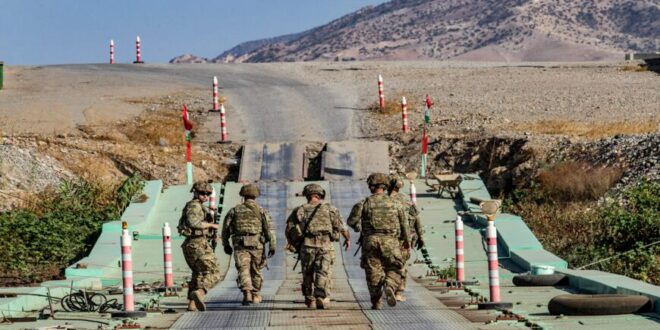Also, Al-Monitor’s on-the-ground reporting on the security situations in Syria and Iraq, including the impact of the Turkish lira crisis on Idlib.
Islamic State ‘entrenched as low-level insurgency’
The most recent report from the Pentagon’s Inspector General on Operation Inherent Resolve, the US-led diplomatic and military operation against the Islamic State (IS) in Iraq and Syria, indicates that IS has weakened but remains a priority for US national security interests in the region.
These quarterly reports provide the most comprehensive reporting and assessment of the US-led mission against IS and therefore deserve attention. Among the latest findings:
The report makes clear that the United States and its coalition partners remain essential to the continued success of the mission.
The Iraq-Syria border remains an area of concern for IS activity.
Economic hardship, the COVID-19 pandemic and a devastating drought, especially in Syria, will continue to shape the environment.
The Iraqi elections and the prospect for continued political stability and progress there is good news for Iraq and the anti-IS coalition effort.
Iran-backed proxy forces and militias in both countries remain a threat to coalition forces and operations.
Both the Iraqi Security Forces and the Syrian Democratic Forces (SDF) will continue to depend on US training and support in “conducting intelligence, surveillance and reconnaissance (ISR), intelligence integration and airstrikes.”There are also country-specific highlights:
In Iraq:
The US mission in Iraq will transition to “training, advising and intelligence gathering” on Dec. 31.
There are no expected changes in the numbers of US troops in Iraq, currently at approximately 2,500.
While IS has carried out a decreasing number of attacks, in some cases it has shown unusual complexity and a “higher level of operational maturity.”In Syria:
The United States maintains approximately 900 troops, and the US mission to work “with, by and through” the SDF to defeat IS has not changed.
The pace and number of counter-IS operations carried out by the US-allied SDF has decreased, and the SDF alone “lacked the ability to conduct persistent surveillance or maintain situational awareness.”
IS appeared to be “consolidating in the desert and poised for increased activity in what the Defense Intelligence Agency (DIA) termed “the next stage of its insurgency.”
IS continued its focus activity in the al-Hol displaced persons camp for recruitment and indoctrination.Al-Monitor provides unmatched reporting and analysis on the security situation in Syria and Iraq and elsewhere in the region, including:
An Iran-linked militia has called for volunteers to fight US troops in Iraq after Dec. 31, reports Shelly Kittleson.
Iraqi populist leader Muqtada al-Sadr, who seeks to form a majority government in Iraq, has called for the “liquidation” of pro-Iran militias, Ali Mamouri reports.
How the Turkish lira crisis is affecting the residents of Idlib, which started using the lira last year, reports Khaled al-Khateb.
How a devastating drought is affecting the lives of Syrians, reports Khateb and Amberin Zaman.
Reports of a planned attack on a prison in Syria that houses thousands of Iraqi IS operatives, reports Kittleson.
The backstory on why the Islamic Revolutionary Guard Corps (IRGC) commander in Syria was removed, perhaps at Syrian President Bashar al-Assad’s request, Ali Hashem reports.
Islamic State attacks in Iraq's Diyala province seek to spark sectarian bloodletting, Kittleson reports.Giving credit where due
Operation Inherent Resolve has been a massive success story since it was launched by the Obama administration in 2014, and it deserves repeating — as it has occurred amid steady criticism from both the right and left and in the region — that the United States was stepping back from its commitments in the Middle East.
It may be easy to forget that IS in 2014 had overrun large parts of Iraq and Syria, instituting a brutal reign of terror. IS took Raqqa, the seventh-largest city in Syria, and Mosul, the third-largest city in Iraq, and murdered, raped, tortured and beheaded those who crossed them.
The Obama administration went all in on its commitment to defeat IS and never wavered. As we wrote here in February, the execution of the US-led policy has been mostly textbook: The mission sustained bipartisan congressional support across three (both Republican and Democrat) administrations and near-flawless civilian and military coordination both within the US government and across the coalition as well as with local partners of varying capabilities.
By March 2019, the US-led coalition had “territorially defeated” IS, and more than two years later, IS still holds no ground in either country. The intense coordination between the United States and Iraqi Security Forces over these past seven years has also been instrumental in deepening the US-Iraq strategic partnership and the steady progress that has occurred in Iraq, including in the October elections that, according to the United Nations and other observers, may have set a new standard for transparency in the region.
 Eurasia Press & News
Eurasia Press & News




